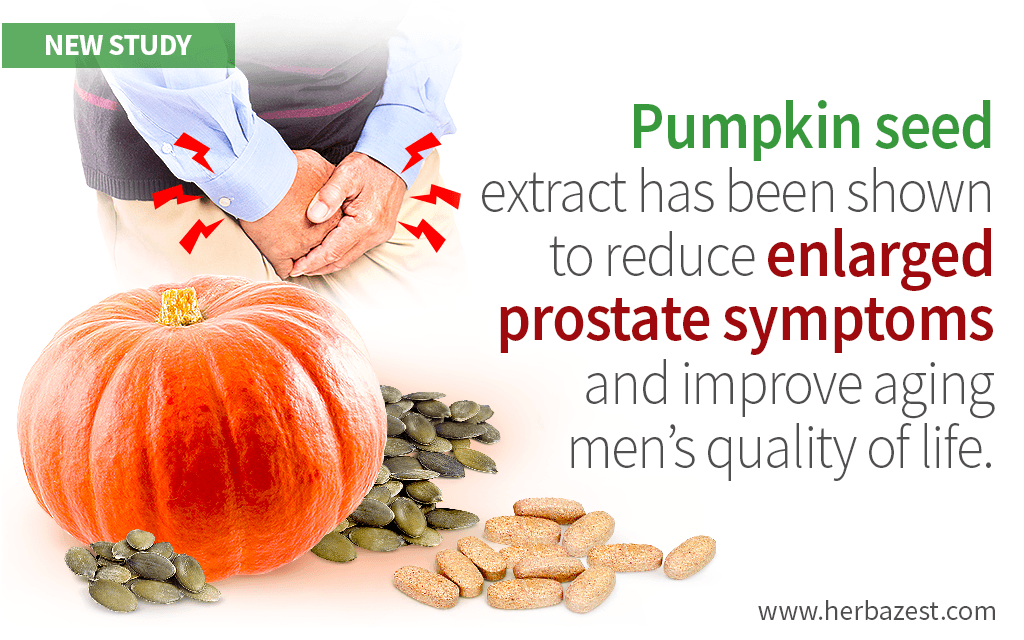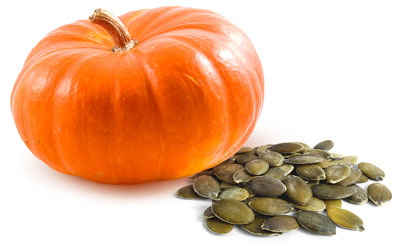Benign prostatic hyperplasia (BPH), commonly referred to as an enlarged prostate, is a condition that mainly affects aging men.1 Enlarged prostate puts pressure on the urethra, leading to lower urinary tract symptoms, including frequent urination during the day and night (nocturia), urine retention, poor urine stream, and incontinence, among others.
Previous in vitro and animal studies have shown promising results of using pumpkin preparations for lower urinary tract symptoms associated with BPH, including seed powders, seed oil, and more.2,3,4 The aim of this human trial was to deepen the understanding of the effects of pumpkin on BPH symptom relief, this time using an oil-free, hydroethanolic extract from pumpkin seeds.
The Study
This was a single-arm, pilot clinical trial conducted at the medical office of Dr. Martin Leibbrand (one of the trial's researchers) and an independent clinical research organization, BioTeSys GmbH, both located in Esslingen, Germany. The results were published in the Journal of Medicinal Food.
Researchers recruited 56 men in their early 60s with moderate to severe symptoms of BPH. An average total International Prostate Symptom Score (IPSS) for all participants was 14.8 (IPPS is a valid tool used to measure the severity of lower urinary tract symptoms and quality of life).
Participants were given a proprietary oil-free, hydroethanolic extract from pumpkin seeds, which was pressed into tablets. The regimen consisted of one tablet (500 mg of pumpkin seed extract) daily at bedtime for three months.
IPSS scores and post-void residual urine volume (amount of urine that remains in the bladder after peeing) were measured during and after the completion of the trial and compared with those at baseline.
For reference, a total IPSS between 0-7 is classified as mild symptoms; 8-19 as moderate symptoms; and 20-35 as severe symptoms.
The Results
After the completion of the study, there was a 30% reduction in total IPSS scores among the participants. In fact, initial significant improvements (by 17.1%) were already seen after the first four weeks and strengthened thereafter. Also, symptoms of 20 out of 56 participants were reduced from moderate and severe to mild.
Quality of life scores also improved, resulting in an increase from 3 participants to 20 expressing being “pleased” with their quality of life. Similarly, the number of men dissatisfied with their quality of life was reduced from 12 to 2. Overall, 60.7% of participants reported quality of life improvements.
The frequency of nocturia also significantly decreased, similarly to post-void residual urine volume, whose average decreased from 83.67 mL at the beginning of the study to 63.11 mL at its completion.
Additionally, no side effects from pumpkin seed extract consumption were reported in the intervention group.
What Does this Mean?
This human clinical trial demonstrated that oil-free hydroethanolic pumpkin seed extract reduces symptoms of BPH in aging men and improves overall quality of life of its sufferers. These promising findings open doors to new formulations of alternative treatments for enlarged prostate symptoms, including nocturia, that are natural and side effect-free.
Although, the safety and efficacy of preparations from pumpkin for prostate have been shown in this trial, further studies are needed to establish the dosage and the most effective means of its administration for symptom relief.
Other herbs that protect and improve prostate health are saw palmetto, nettle, and pygeum.
Sources
- Journal of Medicinal Food, Effects of an Oil-Free Hydroethanolic Pumpkin Seed Extract on Symptom Frequency and Severity in Men with Benign Prostatic Hyperplasia: A Pilot Study in Humans, 2019
Footnotes:
- National Institute of Diabetes and Digestive and Kidney Diseases. (2014). Prostate Enlargement (Benign Prostatic Hyperplasia). Retrieved December 4, 2019 from https://www.niddk.nih.gov/health-information/urologic-diseases/prostate-problems/prostate-enlargement-benign-prostatic-hyperplasia
- Nutrition Research and Practice. (2009). Effects of pumpkin seed oil and saw palmetto oil in Korean men with symptomatic benign prostatic hyperplasia. Retrieved December 4, 2019 from https://www.ncbi.nlm.nih.gov/pmc/articles/PMC2809240/
- Urologia internationalis. (2015). Effects of pumpkin seed in men with lower urinary tract symptoms due to benign prostatic hyperplasia in the one-year, randomized, placebo-controlled GRANU study. Retrieved December 4, 2019 from https://www.ncbi.nlm.nih.gov/pubmed/25196580
- Archivio Italiano di Urologia e Androlgia. (2016). The role of Cucurbita pepo in the management of patients affected by lower urinary tract symptoms due to benign prostatic hyperplasia: A narrative review. Retrieved December 4, 2019 from https://pagepressjournals.org/index.php/aiua/article/view/aiua.2016.2.136





